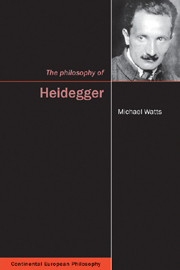Book contents
- Frontmatter
- Contents
- Preface
- Abbreviations
- 1 Heidegger's life
- 2 The meaning of life: the question of Being
- 3 The central ideas in Being and Time
- 4 Conscience, guilt and authenticity
- 5 Being-towards-death
- 6 Dasein's primordial temporality
- 7 The “truth of alētheia” and language
- 8 Heidegger on poetry, poets and Hölderlin
- 9 Heidegger on art
- 10 Heidegger on technology
- 11 Tao, Zen and Heidegger
- 12 Heidegger's politics
- Glossary
- Further reading
- Bibliography
- Index
5 - Being-towards-death
- Frontmatter
- Contents
- Preface
- Abbreviations
- 1 Heidegger's life
- 2 The meaning of life: the question of Being
- 3 The central ideas in Being and Time
- 4 Conscience, guilt and authenticity
- 5 Being-towards-death
- 6 Dasein's primordial temporality
- 7 The “truth of alētheia” and language
- 8 Heidegger on poetry, poets and Hölderlin
- 9 Heidegger on art
- 10 Heidegger on technology
- 11 Tao, Zen and Heidegger
- 12 Heidegger's politics
- Glossary
- Further reading
- Bibliography
- Index
Summary
At the end of his life, in the moments prior to fulfilling his sentence of death by poison, Socrates contemplates, in deep serenity, the relation of truth and death: “The one aim of those who practice philosophy in the proper manner is to practice for dying and death” (Plato, Phd. 64a). Imagine a scenario where you are lying on your death-bed, reviewing your entire life. How would you evaluate your current existence? If you could travel back in time to this present moment, with your “death-bed” perspective, would you make any major changes to the way you currently live? Questions such as this, if contemplated deeply enough, potentially can catalyse a dramatic shift in consciousness, for when we have a truly deep awareness of our own mortality, our petty worries and strivings tend to fall away as naturally as leaves from autumn trees.
In Heidegger's view, it is the encounter with death that most profoundly highlights the question of Being. “Only humanity ‘has’ the distinction of standing and facing death, because the human being is earnest about Being (Seyn): death is the supreme testimony to Being (Seyn)” (GA 65: 230). “Death opens up the question of Being” (GA 65: 284). Thus Heidegger's detailed examination of human mortality was motivated by the question: what can death tell us about the fundamental meaning of Being?
Death was a central theme of Heidegger's thought throughout his entire philosophical career. The immense popularity of Being and Time owed much to his emphasis that “preparedness for death” is a fundamental key to authentic existence – that the disclosure of authentic Being only occurs when Dasein confronts its own finitude by resolutely accepting that it is always, and inescapably, on a journey towards its own death.
- Type
- Chapter
- Information
- The Philosophy of Heidegger , pp. 95 - 115Publisher: Acumen PublishingPrint publication year: 2011

